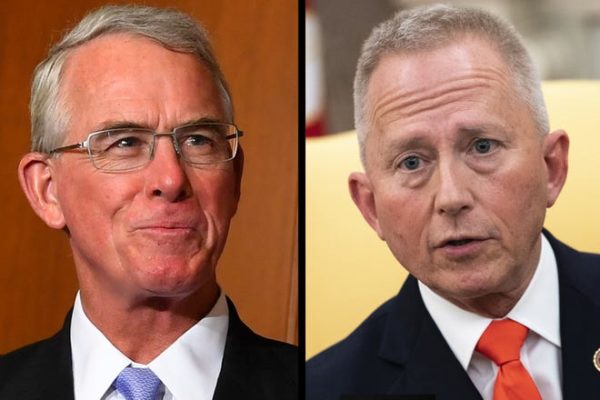WASHINGTON – In mid-October, as Francis Rooney publicly wavered about opposing the impeachment of President Donald Trump, a local GOP leader in Florida called the Republican congressman to say he should get in line behind Trump – or get out of Congress.
A few weeks later, when Democratic Congressman Jeff Van Drew signaled his doubts about impeaching Trump, a party chairman of a key county in his New Jersey district told him over a Sunday meal at a local diner there would be a price to pay if he didn’t support the case against the president.
An already divided nation has grown more polarized since Trump took office nearly three years ago. The president’s impeachment has fanned the political flames even more, especially in Congress where a body once capable of hammering out compromise on immigration, gun control and other thorny issues is paralyzed by partisanship. Those divisions will again be on display in the coming weeks as the Senate prepares for a trial on impeachment. The trial could begin as early as next week, when Pelosi is expected to deliver the articles of impeachment to the Senate.
“There’s very little can be accomplished of any consequence,” Rooney lamented to USA TODAY. “And meanwhile, the country’s got great problems. We’re really good at renaming post offices and moving land around among Indian tribes. But not so good about solving the bigger problems that face the United States.”
The charges:The 2 articles of impeachment against President Trump explained
Rooney and Van Drew are the latest examples of a partisan intolerance on both sides of the aisle. But that backlash didn’t come so much from political leaders in Washington. Instead, it roiled from party activists back home who have grown more unforgiving of political dissent especially on the subject of Trump.
But both lawmakers’ political lives changed almost as soon as they made their positions known about the effort to punish Trump for his efforts to pressure Ukraine into investigating political rival Joe Biden.
Rooney announced he would not seek a third term. Van Drew decided to leave the Democratic party and run for re-election as a Republican.
‘You gotta vote for impeachment’

The Democratic-controlled House last month adopted two articles of impeachment – abuse of power and obstruction of Congress – almost entirely along party lines. No Republicans voted for either article, which now head to the Senate. Van Drew was one of only two Democrats who voted against both.
Van Drew, a long-time state lawmaker from South Jersey, represents a district Trump won by nearly five points in 2016.
Van Drew:‘Unsavory,’ not impeachable: Democratic lawmaker explains why he opposes removing Trump
Garden State progressives already were angry with him for keeping a campaign promise to vote against Nancy Pelosi, D-Calif., for House Speaker a year ago. Then came Oct. 31, when he voted against the resolution formalizing the impeachment inquiry which passed the House and set in motion the impeachment vote in December.
On Dec. 8, Van Drew sat down with Michael Suleiman, chairman of the Atlantic County Democratic Party, who was adamant that the congressman had to reverse course and back impeachment. Suleiman was leading the charge to withhold support for Van Drew in a primary unless he agreed to vote for impeachment.
“His pitch to me was well, I have a 92% voting record with Pelosi, you should give me a pass with this impeachment stuff. He kept saying this is just one vote,” Suleiman recalled. “And I said ‘Jeff, this isn’t just one vote. This is the most important vote you’re going to cast as a member of Congress … Your constituents care about this. They elected a Democrat. You’ve gotta vote for impeachment.”

The congressman disputes using the “92%” number but does say he told Suleiman that the local party’s endorsement shouldn’t be based on his decision on a single issue – “albeit an important vote” – given his past record as a successful Democrat winning numerous local, state and federal races in a red area and his long-time support for key party planks such as climate change, middle-class tax relief and health care.
Van Drew said that conversation at a diner in Egg Harbor Township was the final straw, the culmination of his disaffection with a party whose leaders were not only moving further left but growing intolerant of anyone who dared go against key party positions.
“I’m not asking for anybody to be overly nice or kind to me but perhaps to be a little respectful for the years and years of service that you’ve done,” he said. “And just because your opinion is a little different, you’re not allowed to have a different opinion? That’s wrong in any party.”
Van Drew announced Dec. 19 during an Oval Office meeting with Trump that he was switching parties and becoming a Republican just days after revealing he would vote against impeachment.
“I believe that this is just a better fit for me,” he said. “This is who I am.”
‘You should get out’
Given the House’s passage in September of an offshore oil drilling ban he backed, Rooney said he had already made up his mind to retire next year. But that hadn’t been made public before he went on CNN on Oct. 18 and characterized Trump’s conduct regarding Ukraine as “certainly very, very serious and troubling … I don’t think you can rule (impeachment) out until you know all the facts.”
At the time, Rooney’s comments were the sharpest by a sitting GOP House member against the president. And Democrats seized upon them as a sign that Trump was beginning to lose the confidence of GOP lawmakers.
Rooney ended up joining every other House Republican in voting against impeachment as well as the impeachment inquiry. But his comments at the time sparked a minor rebellion back home in a district Trump won by 22 percentage points.
Senate trial:Democrats rip McConnell after he vowed ‘total coordination’ with Trump White House on impeachment trial
“I can tell you the grass-roots people down here were very, very disappointed in him. And they were very unhappy with his even considering voting for the impeachment,” said Doris Cortese, vice chair of the GOP in Lee County, Florida, which Rooney represents.

Cortese, who talks to Rooney on a regular basis, had spoken to him the day before he made those remarks. The congressman asked her whether he should run again in 2020.
“At that point, I said I’d have to think about it,” she recalled. “Then he came out saying he didn’t know how he would vote on impeachment. I called him back and I said: ‘I think you should get out and not run again. Someone who is more focused and dedicated to Trump’s programs should be running.”
Rooney announced Oct. 19, the day after he appeared on CNN, that he would not be seeking a third term.
Rooney, who has broken with Trump on key issues such as climate change and border wall funding, ultimately concluded the president’s conduct did not rise to the level of impeachment because of a lack of “first-hand” evidence. But he remains “pretty amazed” that neither side seemed to want to know more about the facts surrounding the charges.
“It just put me off that so many people said ‘yes, impeachment we have a crime,’ or ‘no, no impeachment, this is no crime,” without hearing a single shred of evidence,” he said. “I just can’t operate that way.”
Media consumption and political geography
When the Republican-led House impeached Bill Clinton in 1998 over his affair with Monica Lewinsky, members of both parties found common ground. Democrats and Republicans voted for and against each of the four articles being considered.
Two of the articles failed because a significant number of GOP lawmakers broke ranks to join Democrats in opposing them. A third article, pertaining to obstruction of justice, would have been rejected as well had five Democrats not joined most GOP lawmakers in supporting it.
No such bipartisanship played out in Trump’s impeachment.
David Wasserman, who studies House races for the non-partisan Cook Political Report, said the divide that played out over impeachment speaks to “the polarization of media consumption and political geography” that now permeates American politics.

“You don’t win more friends by breaking from your party than you lose allies,” he said. “And so, the political incentives are stronger than ever to stick with your herd or tribe.”
The impeachment debate that surrounded Clinton 21 years ago and President Richard Nixon in 1974 split Congress largely along party lines but not to the level it has now, experts said.
“There’s such a great distance between the sides,” Eric Schickler, a political science professor at the University of California-Berkeley, told a panel on impeachment last month. “The other side becomes an enemy, and you just can’t see giving them anything.”
But there are still glimpses of partisan independence in Congress.
Three Republicans, including Rooney, joined Democrats Thursday in passing a Democrat-led House resolution aimed at curbing Trump’s ability to wage war against Iran amid concerns about the escalation of tensions following the U.S. killing of Gen. Qasem Soleimani, a top Iranian general. Conversely, eight Democrats joined most Republicans in opposing it.
Van Drew, Rooney confident they could have won
Van Drew said he would have won re-election as a Democrat had he chosen to stay in the party.
“You go out and campaign. You talk to people. And you talk about all the things you’ve worked on and done.” he said. “I think I would have been fine.”
Rooney feels similarly.
The former businessman who served as George W. Bush’s ambassador to the Vatican, downplayed the fallout from his impeachment comments, saying it “might” have hurt his election chances had he run again.
Raking it in:Trump campaign says impeachment helped bring in $46 million fundraising haul
“But probably introducing a carbon tax (to combat climate change) and voting against the president’s two emergency declarations (on border wall funding) made more of a difference to some of those people that will blindly follow President Trump than this,” he said.
Cortese, the Lee County GOP official, said local activists were “very pleased” that Rooney voted against impeachment. Had he not, it likely would have cost him his office since many were already unhappy with some of his other votes, she said.
“It would have left a very bad taste in people’s mouths and I don’t think they would forget when it came time to vote,” she said. Impeachment “would have been icing on the cake.”


